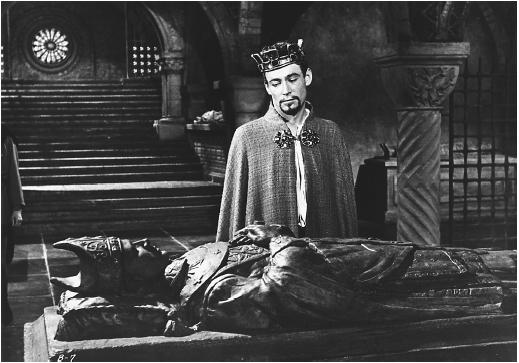Friday
In his testimony yesterday before the Senate Intelligence Committee, former FBI Director James Comey at one point made a reference to Henry II all but ordering the murder of Thomas a Becket. “Will no one rid me of this turbulent priest?” the king supposedly asked, and his knights took the hint and did the ridding. Becket was later canonized as (to quote Chaucer) a “holy blisful matir.” The 1964 film Becket substituted “meddlesome” for “turbulent.”
In Comey’s view, Donald Trump expected him to play the role of Henry II’s knights, in this case taking his leader’s hint to stop investigating former National Security Advisor Michael Flynn:
During Thursday’s testimony, Senator Angus King (I-Maine) asked Comey questions about what he assumed when Trump said to “hold back” on Flynn.
“You said [Trump] said, ‘I hope you will hold back on that.’” “But when a president of the United States in the Oval Office says something like ‘I hope’ or ‘I suggest’ or ‘would you,’ do you take that as a directive?”
Comey replied, “Yes. Yes, it rings in my ear as kind of, ‘Will no one rid me of this meddlesome priest?’”
In the past I’ve applied T.S. Eliot’s version of the scene (in Murder in the Cathedral) and Shakespeare’s use of it (in Richard II) to Chris Christie’s Bridgegate scandal. In fits here as well. In Richard II, the usurping Henry IV plays the role of Henry II, wishing that the king he has overthrown were dead. Some of his knights take the hint and, voila, Richard turns up a corpse. We learn about Henry IV’s wishes from his knights:
Exton Didst thou not mark the king, what words he spake,
‘Have I no friend will rid me of this living fear?’
Was it not so?
Servant These were his very words.
Exton ‘Have I no friend?’ quoth he: he spake it twice,
And urged it twice together, did he not?
Servant He did.
Exton And speaking it, he wistly look’d on me,
And who should say, ‘I would thou wert the man
That would divorce this terror from my heart’;
Meaning the king at Pomfret. Come, let’s go:
I am the king’s friend, and will rid his foe.
How close is Trump’s “I hope you will hold back on that” to Henry’s “Have I no friend will rid me of this living fear?” If one goes by either Eliot’s or Shakespeare’s play, Comey made a wise decision not to act on the hint. What happens to those who do their king’s dirty work is not promising.
Let’s start first with the killers in Eliot’s play, who at least are aware that the king will disavow them:
King Henry–God bless him–will have to say, for reasons of state, that he never meant this to happen; and at the best we shall have to spend the rest of our lives abroad.
The killers of Richard, by contrast, are taken by surprise:
Exton Great king, within this coffin I present
Thy buried fear: herein all breathless lies
The mightiest of thy greatest enemies,
Richard of Bordeaux, by me hither brought.
Henry Bolingbroke Exton, I thank thee not; for thou hast wrought
A deed of slander with thy fatal hand
Upon my head and all this famous land.
Exton From your own mouth, my lord, did I this deed.
Henry They love not poison that do poison need,
Nor do I thee: though I did wish him dead,
I hate the murderer, love him murdered.
The guilt of conscience take thou for thy labor,
But neither my good word nor princely favor:
With Cain go wander through shades of night,
And never show thy head by day nor light.
“They love not poison that do poison need” and “I hate the murderer, love him murdered” are masterful instances of a politician weaseling out of responsibility. We now call it “plausible deniability.” Like Henry, Trump has shown that he is fully prepared to throw his subordinates under the bus when it serves his ends (Carter Page, Paul Manafort).
Only Trump doesn’t have the impulse control that Eliot’s Henry II and Shakespeare’s Henry IV have. He hints to Comey and then, after firing him, admits in an interview that he did so because of the Russia investigation. That’s like first hinting, “Will no man rid me of this meddlesome priest?” and then later saying, “I fired him because he wouldn’t rid me of this meddlesome priest.”
Comey refused to play the fall guy and the Russia investigation, unlike Becket and Richard II, is still alive and kicking. The king is not happy.


